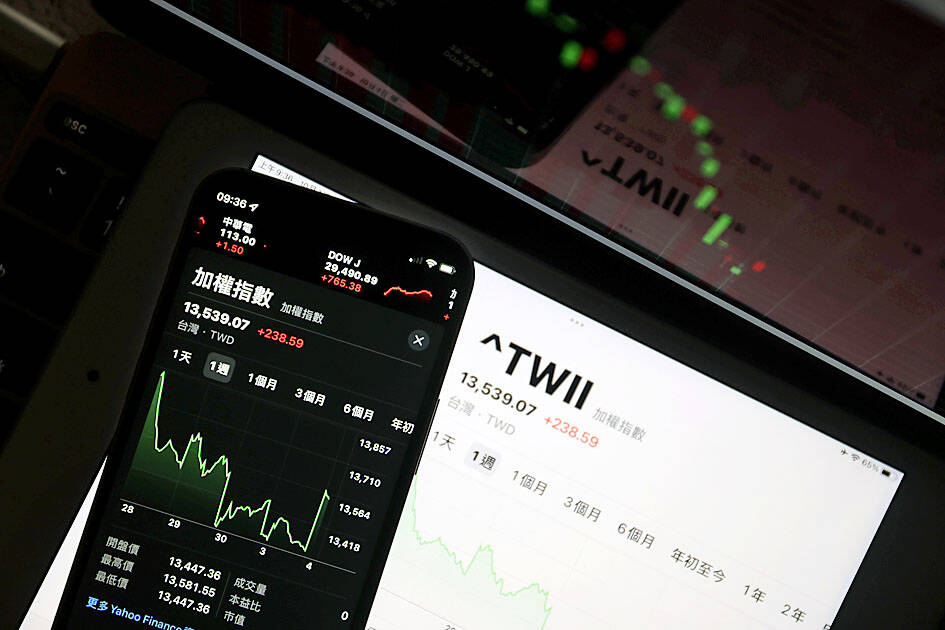The TAIEX yesterday made a strong comeback, as an overnight rally on Wall Street and expectations of a dovish turn by the US Federal Reserve sparked buying on the local bourse.
With the US dollar weakened amid anticipation that the Fed would ease the pace of its rate hike cycle, local investors rushed to pick up large-cap tech stocks, focusing on semiconductors, while buying later spread to biotech and petrochemical stocks.
The TAIEX closed up 276.04 points, or 2.08 percent, at 13,576.52. Turnover totaled NT$181.294 billion (US$5.71 billion), with foreign institutional investors selling a net NT$6.17 billion of shares on the main board, Taiwan Stock Exchange data showed.

Photo: CNA
“The US markets kept dictating the local main board as the latest US PMI [purchasing managers’ index] allayed fears over an aggressive Fed,” Moore Securities Investment Consulting Co (摩爾投顧) analyst Adam Lin (林漢偉) said.
The US PMI results for last month fell short of earlier market predictions, causing 10-year US Treasury yields to dip 15 basis points overnight and sending the US dollar lower on the Taipei foreign exchange market yesterday.
Taiwan Semiconductor Manufacturing Co (台積電) rose 2.88 percent to close at NT$429, contributing about 100 points to the TAIEX’s gains and pushing the electronics sector and semiconductor subindex up by 2.74 percent and 3.22 percent respectively.
“As the electronics sector accounted for almost 60 percent of Tuesday’s turnover, many non-tech stocks attracted relatively low buying,” Lin said. “However, the biotech industry stole part of the spotlight on bargain hunting.”
The biotech sector rose 2.93 percent.
The petrochemical sector rose 1.15 percent, while the financial sector underperformed the broader market, increasing only 0.63 percent.
“Today’s gains helped the TAIEX overcome the nearest technical resistance ahead of the five-day moving average of 13,460 points, which is expected to allow the main board to move higher,” Lin said.
“I expect the government will come up with measures to boost the market, and if turnover expands to NT$200 billion or more, the TAIEX is likely to challenge 13,773 points — the next technical hurdle of the 10-day moving average — soon,” Lin said, referring to a regular meeting scheduled by the National Stabilization Fund’s committee for tomorrow.

When Lika Megreladze was a child, life in her native western Georgian region of Guria revolved around tea. Her mother worked for decades as a scientist at the Soviet Union’s Institute of Tea and Subtropical Crops in the village of Anaseuli, Georgia, perfecting cultivation methods for a Georgian tea industry that supplied the bulk of the vast communist state’s brews. “When I was a child, this was only my mum’s workplace. Only later I realized that it was something big,” she said. Now, the institute lies abandoned. Yellowed papers are strewn around its decaying corridors, and a statue of Soviet founder Vladimir Lenin

UNIFYING OPPOSITION: Numerous companies have registered complaints over the potential levies, bringing together rival automakers in voicing their reservations US President Donald Trump is readying plans for industry-specific tariffs to kick in alongside his country-by-country duties in two weeks, ramping up his push to reshape the US’ standing in the global trading system by penalizing purchases from abroad. Administration officials could release details of Trump’s planned 50 percent duty on copper in the days before they are set to take effect on Friday next week, a person familiar with the matter said. That is the same date Trump’s “reciprocal” levies on products from more than 100 nations are slated to begin. Trump on Tuesday said that he is likely to impose tariffs

HELPING HAND: Approving the sale of H20s could give China the edge it needs to capture market share and become the global standard, a US representative said The US President Donald Trump administration’s decision allowing Nvidia Corp to resume shipments of its H20 artificial intelligence (AI) chips to China risks bolstering Beijing’s military capabilities and expanding its capacity to compete with the US, the head of the US House Select Committee on Strategic Competition Between the United States and the Chinese Communist Party said. “The H20, which is a cost-effective and powerful AI inference chip, far surpasses China’s indigenous capability and would therefore provide a substantial increase to China’s AI development,” committee chairman John Moolenaar, a Michigan Republican, said on Friday in a letter to US Secretary of

Taiwan Semiconductor Manufacturing Co’s (TSMC, 台積電) market value closed above US$1 trillion for the first time in Taipei last week, with a raised sales forecast driven by robust artificial intelligence (AI) demand. TSMC saw its Taiwanese shares climb to a record high on Friday, a near 50 percent rise from an April low. That has made it the first Asian stock worth more than US$1 trillion, since PetroChina Co (中國石油天然氣) briefly reached the milestone in 2007. As investors turned calm after their aggressive buying on Friday, amid optimism over the chipmaker’s business outlook, TSMC lost 0.43 percent to close at NT$1,150